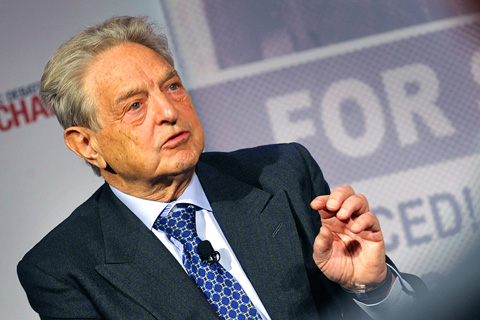The credit crisis is far from over, billionaire financier George Soros warned yesterday, urging regulators to move faster to contain damage from the collapse of the housing finance markets.
“I think the situation is more serious than the authorities admit or recognize,” Soros told journalists in a conference call.
Measures taken so far to slash interest rates and stimulate the economy were “necessary but not sufficient,” he said.

PHOTO: AFP
“Because of that, I think the situation is going to get worse before it gets better,” he said.
Soros is promoting a new book, The New Paradigm for Financial Markets: The Credit Crisis and What It Means.
He has urged regulators to move aggressively to improve market oversight to curb risks from excessive reliance on debt for financial speculation.
He said he agreed with the IMF estimate of more than US$1 trillion in losses linked to the collapse of mortgage-backed securities.
Losses disclosed by financial institutions so far are related only to the decline in value of those financial instruments, Soros said.
“They do not reflect in any way a possible decline in the value of the loans held by the banks,” he said.
“We have not yet seen the full effect of the possible recession,” he said.
Soros said that hedge funds struggling to clear up massive levels of debt are another pitfall.
He pointed to the potential for massive losses from complex investments linked to the US subprime mortgage market, such as credit default swaps, or CDS, which allow investors to put bets on the likelihood that companies will default on bond payments.
He described the US$45 trillion market in credit swaps as a “Sword of Damocles.”
“That’s more than five times the entire government bond market of the United States. It’s almost equal to the entire household wealth of the United States,” Soros said.
“This US$45 trillion market is totally unregulated,” he said. “You can have very large positions with very little capital and you can actually assume risk and get paid for assuming that risk without being regulated.”
American International Group Inc, the largest US insurer, for example, reported that its swap portfolio lost US$11.12 billion in value in the fourth quarter of last year because decaying credit quality means insured debt is less likely to be repaid.
That news prompted fears of further losses throughout the industry.
The potential risks from such investments has engendered a damaging level of mistrust among financial institutions, accentuating the current credit crunch, Soros said.

UKRAINE, NVIDIA: The US leader said the subject of Russia’s war had come up ‘very strongly,’ while Jenson Huang was hoping that the conversation was good Chinese President Xi Jinping (習近平) and US President Donald Trump had differing takes following their meeting in Busan, South Korea, yesterday. Xi said that the two sides should complete follow-up work as soon as possible to deliver tangible results that would provide “peace of mind” to China, the US and the rest of the world, while Trump hailed the “great success” of the talks. The two discussed trade, including a deal to reduce tariffs slapped on China for its role in the fentanyl trade, as well as cooperation in ending the war in Ukraine, among other issues, but they did not mention

Japanese Prime Minister Sanae Takaichi yesterday lavished US President Donald Trump with praise and vows of a “golden age” of ties on his visit to Tokyo, before inking a deal with Washington aimed at securing critical minerals. Takaichi — Japan’s first female prime minister — pulled out all the stops for Trump in her opening test on the international stage and even announced that she would nominate him for a Nobel Peace Prize, the White House said. Trump has become increasingly focused on the Nobel since his return to power in January and claims to have ended several conflicts around the world,

GLOBAL PROJECT: Underseas cables ‘are the nervous system of democratic connectivity,’ which is under stress, Member of the European Parliament Rihards Kols said The government yesterday launched an initiative to promote global cooperation on improved security of undersea cables, following reported disruptions of such cables near Taiwan and around the world. The Management Initiative on International Undersea Cables aims to “bring together stakeholders, align standards, promote best practices and turn shared concerns into beneficial cooperation,” Minister of Foreign Affairs Lin Chia-lung (林佳龍) said at a seminar in Taipei. The project would be known as “RISK,” an acronym for risk mitigation, information sharing, systemic reform and knowledge building, he said at the seminar, titled “Taiwan-Europe Subsea Cable Security Cooperation Forum.” Taiwan sits at a vital junction on

LONG-HELD POSITION: Washington has repeatedly and clearly reiterated its support for Taiwan and its long-term policy, the Ministry of Foreign Affairs said US Secretary of State Marco Rubio yesterday said that Taiwan should not be concerned about being used as a bargaining chip in the ongoing US-China trade talks. “I don’t think you’re going to see some trade deal where, if what people are worried about is, we’re going to get some trade deal or we’re going to get favorable treatment on trade in exchange for walking away from Taiwan,” Rubio told reporters aboard his airplane traveling between Israel and Qatar en route to Asia. “No one is contemplating that,” Reuters quoted Rubio as saying. A US Treasury spokesman yesterday told reporters